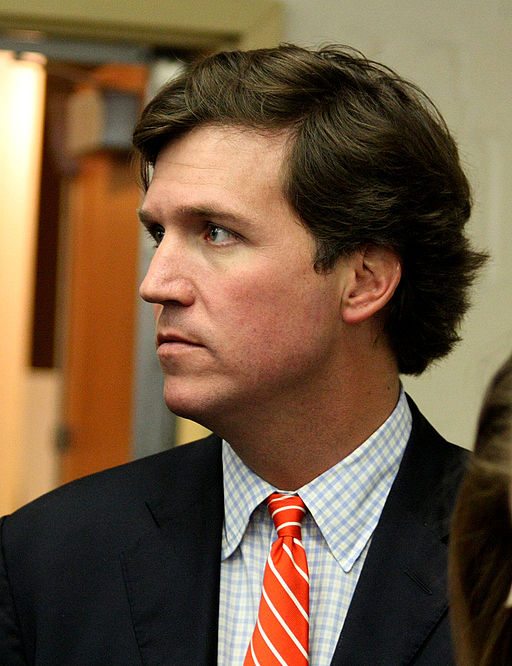
June 2, 2017; Washington Post
Even as President Trump has made a habit of excoriating the press at every opportunity, many have observed his propensity to take questions in press conferences from the reporters of the Daily Caller, along with other conservative news sites over those of other reporters. Now, the Washington Post reports that the Daily Caller has a couple of noteworthy special relationships that bear examination in this context.
One is with a nonprofit called the Daily Caller News Foundation, a 501(c)(3) public charity which, according to the Washington Post, employed around half of the reporters published on the DailyCaller.com news sites. The four-member board of the foundation, according to the foundation’s 2015 IRS Form 990, includes Neil Patel and Tucker Carlson, founders of the for-profit entity. This creates an interlocking directorate. The for-profit site is supported by advertising, while the nonprofit, which acts as an in-house wire service for the for-profit, is supported by grants. They even share the same floor of offices.
As reported by the Center for Media and Democracy (CMD), “Carlson never disclosed the Trump campaign cash to his viewers on Fox News, even as he analyzed the presidential race. Meanwhile, as a Fox News headliner, Carlson has attacked news outlets like the New York Times, claiming they are biased against Trump.”
“It really does look like the reason for the existence of this 501(c)(3) organization is to provide benefits to the for-profit company, and that should be a private benefit that is not acceptable,” said Linda Sugin, a law professor at Fordham University. “You can’t have money going into the foundation being used for purposes that are really to support the for-profit organization.”
Patel says he is “very comfortable” with the relationship between the nonprofit and for-profit ventures because they do not offer their content solely to the Daily Caller. More than 200 other publishers receive it, some of which post articles periodically. On the other hand, when the CMD studied a two-week period, DailyCaller.com published all 672 articles produced by the Daily Caller News Foundation, and there were no duplicate stories between the for-profit and the nonprofit.
Throughout those two sampled work weeks, 46 percent of the content published in DailyCaller.com’s Politics section was created by the nonprofit affiliate, as was 67 percent of its U.S. section, 84 percent of its World section, 95 percent of its Business section, 44 percent of its Education section, and 99 percent of its Energy section.
“I’m not doing anything anyone else can’t do,” Patel said, “As long as what I’m doing at the nonprofit is available for free to everybody, the fact that the Daily Caller wants to use it more than others is fine. Others could take advantage of the same thing.”
Benjamin M. Leff, a nonprofit tax specialist at American University, thinks this argument works.
Sign up for our free newsletters
Subscribe to NPQ's newsletters to have our top stories delivered directly to your inbox.
By signing up, you agree to our privacy policy and terms of use, and to receive messages from NPQ and our partners.
If the organization had an exclusive arrangement under which its content was used only by the for-profit affiliate, then a strong case could be made that it was operated for the private benefit of the for-profit. But the fact that it also provides its content to other publishers for free is evidence that it is not operated for the private benefit of the for-profit, even if the for-profit is the dominant user of its content.
But not everyone thinks so. “It’s a huge rip-off for taxpayers if the Daily Caller News Foundation is receiving revenue that it doesn’t pay taxes on, to produce stories that are used by the for-profit enterprise, which then makes money on the stories through ads,” said Lisa Graves, executive director of the Center for Media and Democracy (CMD).
The second special relationship worth noting is between DailyCaller.com and Donald Trump’s presidential campaign, which spent around $150,000 according to CMD to rent its lists of subscribers for fundraising purposes last year. The resulting emails were co-branded. According to CMD, the relationship between the news site and the Trump campaign and presidency appears to be far less than arm’s length and in violation of many ethical principles, both for nonprofits and for journalism.
CMD’s analysis of the emails, tweets, and stories indicates that candidate Trump, The Daily Caller, and its nonprofit affiliate enjoyed a symbiotic relationship.
For example, as the Trump campaign was buying access to The Daily Caller email list, in the three weeks leading up to the November election, Trump tweeted out eight Daily Caller stories to his audience of 26.5 million followers. During that same period, DailyCaller.com published numerous anti-Hillary Clinton articles produced by The Daily Caller News Foundation, some of which echoed Trump claims or were echoed by the campaign or its surrogates. Since the election, Trump has continued to promote The Daily Caller claims and Carlson.
Indeed, Trump’s infamous fake news assertion of “what happened in Sweden last night” at his first post-Inauguration rally was based on a clip from Carlson’s show the night before featuring Ami Horowitz, whose claims have been sharply criticized. And, as was widely documented, no incident happened in Sweden the night before Trump’s speech.
There are four potential problems here:
- A nonprofit has been established to feed content to a for-profit website, and it is doing so on a relatively exclusive basis. This is worth cash to the for-profit in advertising dollars and that, therefore, means that the nonprofit is violating the purpose of a 501(c)(3), at least in spirit. Groups registered as 501(c)(3) nonprofits “must not be organized or operated for the benefit of private interests.”
- The for-profit entity is disseminating the material and thus has the readership list, which it has rented to the Trump campaign. This creates a link between the purportedly independent press and what is at that point a partisan political campaign. It also places the nonprofit in that closed circle.
- The IRS is unlikely to wade into all of this in the wake of the investigations into its own alleged targeting of conservative applicants for tax-exempt status.
- This combination of events and relationships is yet one more example of an inappropriate use of nonprofits to feed public skepticism about our sector.
—Ruth McCambridge












